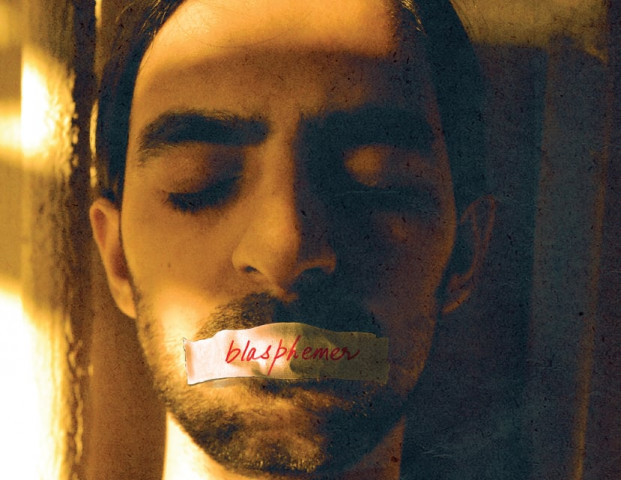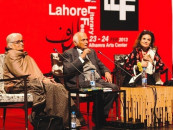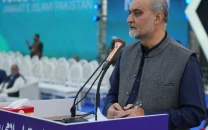Shackled: Guilty until proven innocent
Prisoners accused of blasphemy face gross abuse and mental torture as they languish in jails across the country.

Prisoners accused of blasphemy face gross abuse and mental torture as they languish in jails across the country. PHOTO: EXPRESS
Hamid Hussain, 25, lives in a state of constant fear. Life before last March, the month when everything turned upside down, now seems a distant dream.
Hussain was considered a blasphemy suspect, and straight away flung into a cell exclusively for militants and terrorists. He spent several days and nights in solitary confinement – a five-by-five room, a dim light bulb, an overflowing toilet.
The words ‘Tauheen-e-Risalat’ were stamped outside the cell door.
“Inmates would kick and shout, ‘Kafir, we will kill you!’” the bulky, unshaved prisoner recalls in a low voice, speaking through the intercom at Malir Jail, where he was eventually transferred after receiving unending threats in the Karachi Central Jail. “I would lay awake the entire night, waiting for the time that they [the inmates] would slip into my room and slit my throat.”
Rampant abuse behind locked doors
In the dark, shackled world of jails, life for blasphemy prisoners is harsh. They are abused by officials, threatened by inmates, and shunned by family. Many are placed in isolated rooms, a treatment usually reserved for high-profile prisoners.
And yet, despite these accounts, jail officials deny mistreatment of such prisoners and defend the decision to isolate them.
“These cases are sensitive and need to be kept alone to avoid attacks,” states Inspector General Prisons Nusrat Mangan.
He refuses to share details of how many blasphemy accused are currently in Karachi jails

Of reluctant lawyers and desperate clients
Hussain, like most other blasphemy prisoners, faces the problem of lacking proper representation in court, as lawyers are unwilling to take on these controversial cases. He was accused of blasphemy just days after he moved from Tehran to Karachi, and his father, lawyer Imran Liaquat Hussain, initially handled his representation.
However, the death of his father just two months ago has left him in the lurch.
His case is somewhat peculiar. It was initially registered under section 295-A against three men in December, 2011, for circulating pamphlets. According to Hussain, his name was furtively inserted into the FIR four months after it was first registered.
“The allegations are absurd. I have nothing to do with the circulation of the pamphlets. I don’t know the printer or the distributer or the men involved,” says Hussain, discreetly glancing at the Ferrari watch on his wrist. “One police inspector who knew my family lodged a false case against me. He then asked me to pay Rs25 lakh for dropping it.”
His mother, Farzana, stands separated from her son by a glass window, worry etched across her face. According to her, the family has approached several lawyers, all of who have turned down the case or demanded obscene amounts of money for pursuing it.
Senior lawyer Farooq Ahmed reiterates this stance. He adds that lawyers avoid such cases because of potential threats. “When private lawyers refuse to take up these cases, the court then calls for a lawyer at the state’s expense, but these, too, are unwilling,” says Ahmed.
Anguish and angst
Shopkeeper Saleem Suleman, who was accused of blasphemy and interviewed last year, could not stop crying hysterically and shouting for help.
This is not uncommon. A dearth of psychologists and counselling services leaves many blasphemy prisoners shaky and unstable. In 2011, Karachi’s central jail witnessed the true extent of the mental anguish when convict Qamar David died due to a heart attack. Letters written to the Human Rights Commission of Pakistan (HRCP) during his time in prison stated repeatedly that he was under severe mental stress and constantly feared death.
“It is the responsibility of the prison authorities to provide security to such prisoners,” says HRCP Chairperson Zohra Yusuf. “Prisoners cannot be kept in isolation for long stretches as this results in depression.”
Yusuf adds that there have been multiple cases of those accused of blasphemy being killed in jails across the country.
Hussain, who has spent 15 months in jail already, is indeed depressed and lonely. In this state, he clings to the writings of Rumi, Ghalib and Firdousi. “I can’ wait for my case to be over,” he says quietly, looking down. “The jail is not safe for me, and neither will the city be once I’m out. The first thing I will do is leave the country.”
Published in The Express Tribune, May 31st, 2013.



















COMMENTS
Comments are moderated and generally will be posted if they are on-topic and not abusive.
For more information, please see our Comments FAQ